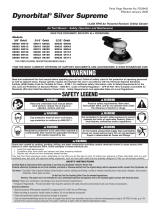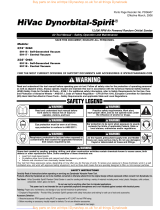2
Filter
Regulator
Lubricator
90 PSIG
(6.2 Bar)
To Tool Station
Ball
Valve
Ball
Valve
Filter
Regulator
Lubricator
Air Flow
Drain
Valve
Drain
Valve
Air Tool
Air Compressor
and Receiver
Drain Valve
Air Hose
90 PSIG MAX
(6.2 Bar)
Air Flow
Refrigerated
Air Dryer
1 DROP/MIN.
20 SCFM
LUBRICATOR SETTING
• Dynabrade Air Power Tools are designed to operate at 90 PSIG
(6.2 Bar) maximum air pressure at the tool inlet, when the tool is
running. Use recommended regulator to control air pressure.
• Ideally the air supply should be free from moisture. To facilitate
removing moisture from air supply, the installation of a refrigerated
air dryer after the compressor and the use of drain valves at each
tool station is recommended.
➤
➤
➤
➤
➤
➤
AIR SYSTEM
Closed Loop Pipe System, Sloped in Direction of Air Flow
MAINTENANCE INSTRUCTIONS
Important: To keep tool safe, a Preventative Maintenance Program is
recommended. The program should included inspection of the tool and all
related accessories and consumables, including air lines, pressure regulators,
filters, oilers, etc. refer to ANSI B186.1 for additional maintenance information.
If accessory or tool breakage occurs, investigate failure to determine the
cause and correct before issuing tool for work. Use the following schedule as
a starting point in developing a Preventative Maintenance Program. If tool
does not operate properly (RPM, Vibration, Start/Stop) after these scheduled
checks or at any time, the tool must be repaired and corrected before returning
tool to use.
INSTALLATION
• To ensure long life and dependable service, use a Closed Loop Air System
and Filter-Regulator-Lubricator as diagramed below.
• Each tool should have its own dedicated hose connected to an air supply
manifold. Quick disconnects should be installed at the manifold in an effort
to reduce contamination into the tool.
• It is strongly recommended that all Dynabrade rotary vane air tools be used
with a Filter-Regulator-Lubricator to minimize the possibility of misuse due
to unclean air, wet air or insufficient lubrication. Dynabrade recommends
the following: 10681 Air Line Filter-Regulator-Lubricator — Provides
accurate air pressure regulation, two-stage filtration of water contaminants
and micro-mist lubrication of pneumatic components.
• Dynabrade recommends one drop of air lube per minute for each 20 SCFM
(example: if the tool specification states 40 SCFM, set the drip rate on the
filter-lubricator to 2 drops per minute) Dynabrade Air Lube (P/N 95842:
1pt/473ml) is recommended.
MAINTENANCE SCHEDULE
Daily (every 8 hours):
• Inspect tool and accessories for damage or broken parts. Replace items
as necessary to ensure proper operation and safety.
• Lubricate motor as recommended. Use Dynabrade Air Lube (P/N 95842:
1pt/473ml) 10W/NR. (1 Drop per minute of air lube per 20 SCFM.)
• Check air line pressure with a gage. (MAX. 90 PSIG or 6.2 Bar operating
pressure at the air inlet of the tool.)
• Right angled gear and wick system through gear case grease fitting with
3 plunges of gear oil (P/N 95848) and grease gun (P/N 95541). (Prime
grease gun prior to greasing.)
• Check tool for proper operation: If operating improperly or demonstrates
unusual vibration, the tool must be serviced and problem corrected before
further use.
Every 20 Hours or Once a Week Which Ever Comes First:
• Check free speed of tool without the abrasive accessory mounted. Measure
RPM (speed) with tachometer and with air pressure set at 90 PSIG while the
tool is running. If a governed tool is operating at a higher speed than the
RPM marked on the tool housing, the tool must be serviced and corrected
before use. A non-governed tool may exceed the RPM marked on the tool
by 10% when operated at free speed with no accessories.
• If tool is running fast look for worn, damaged or missing governors, air
control rings and silencers. Special care must be taken when servicing
governors and speed control devices. Injection molded governor assemblies
are non-serviceable and must be replaced.
• If tool is running slow look for clogged inlet screen, air stream, silencer(s)
or a malfunctioning governor (see concerns for servicing governors).
Service as required.
Every 50 Hours:
• Lubricate planetary gears through gear case grease fitting with 3 plunges
of grease (P/N 95542) and grease gun (P/N 95541). (Prime grease gun
prior to greasing.)
REPAIR
• Use only genuine Dynabrade replacement parts to ensure quality. To order
replacement parts, specify Model#, Serial# and RPM of your air tool.
• Mineral spirits are recommended when cleaning the tool and parts. Do
not clean tool or parts with any solvents or oils containing acids, esters,
ketones, chlorinated hydrocarbons or nitro carbons.
• DO NOT clean or maintain tools with chemicals that have a low flash point
(example: WD-40
®
).
• Motor Tune-Up Kit are available (when applicable) which includes high
wear and medium wear motor parts.
• Air tool markings must be kept legible at all times, if not, reorder housing
and replace. User is responsible for maintaining specification information.
• After maintenance is performed on tool, add a few drops of Dynabrade
Air Lube (P/N 95842) to the tool inlet and start the tool a few times
to lubricate air motor. Verify RPM (per 20 hr maintenance schedule),
vibration and operation.
HANDLING & STORAGE
• Use of tool rests, hangers and/or balancers is recommended.
• Protect tool inlet from debris (see Notice).
• DO NOT carry tool by air hose or near the tool throttle lever.
• Store accessories in protective racks or compartments to prevent damage.
• Follow the handling instructions outlined in the operating instructions when
carrying the tool and when changing accessories.
• Protect accessories from exposure to water, solvents, high humidity,
freezing temperature and extreme temperature changes.
END OF USE/ DISPOSAL
When tool has reached its end of useful service, disassemble tool into its
primary components (i.e. steel, aluminum and plastic part) and recycle or
discard per local, state and/or federal regulations as to not harm the
environment.
NOTICE
All Dynabrade motors use the highest quality parts and metals available and
are machined to exacting tolerances. The failure of quality pneumatic motors
can most often be traced to an unclean air supply or the lack of lubrication.
Air pressure easily forces dirt or water contained in the air supply into motor
bearings causing early failure. It often scores the cylinder walls and the rotor
blades resulting in limited efficiency and power. Our warranty obligation is
contingent upon proper use of our tools and cannot apply to equipment
which has been subjected to misuse such as unclean air, wet air or a lack
of lubrication during the use of this tool.





